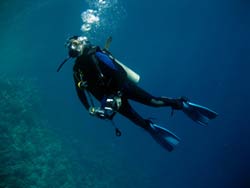潜水是很多人都喜欢的运动。在神秘的大洋海底,绚烂多彩的世界让人着迷。可要是这时水中呼吸器发生故障可就麻烦了。下面这篇文章就教您如何应对这种事情。
Diving equipment failure, yikes! While we all agree this would be a frightening experience, it's usually not as dire as it sounds. When you hear about a diving incident, it most often involves a malfunctioning regulator or a tank low on air. There are two things you need to worry about if your equipment fails:
Your lungs
The bends

Typical recreational SCUBA divers breathe either compressed air (78 percent nitrogen(氮), 21 percent oxygen) or an oxygen-enriched, nitrogen-oxygen combination called Nitrox (64 to 68 percent nitrogen, 32 to 36 percent oxygen). The gas is contained in a cylinder that you carry on your back. You can't breathe directly out of the tank because the high pressure would damage your lungs. Therefore, the cylinder is fitted with a regulator. The regulator does two things: It reduces the pressure from the tank to a safe level for you to inhale, and it supplies air on demand.
To accomplish these tasks, regulators have two stages:
First stage attaches to the cylinder. It reduces the pressure from the tank (3000 psi(磅/平方尺) or 204 atmospheres) to an intermediate pressure (140 psi or 9.5 atmospheres).
Second stage is connected to the first stage by a hose. It reduces the pressure from the intermediate pressure to ambient water pressure (such as one to five atmospheres, depending upon depth). The second stage also supplies air, either only when you inhale (typical operation) or continuously (emergency operation).
So what would happen if your regulator were to malfunction or your tank ran out of air? Obviously, when the air stops, your first instinct will be to head straight for the surface. But before you do, there are two things to keep in mind.
As you ascend back to the surface, the air in your lungs will expand. In order to keep your lungs from expanding too quickly or too much, you need to exhale as you float to the surface. Think about a balloon. Say you take a blown-up balloon with you as you dive 30 feet below the ocean's surface. The balloon will deflate to about half its capacity by the time you reach your destination because of the pressure of all that water pushing down on it. As you go back to the surface, it will expand. Now let's say you took an empty balloon down 30 feet and somehow inflated it to normal size down there. Then you brought it back to the surface with you. What happens? It expands beyond its capacity and bursts. The same thing would happen to your lungs if you don't exhale constantly. If you exhale and rise no faster than the bubbles do, you should be OK.
The other thing you have to worry about, depending on how deep you are when you run out of air, is the "bends."
The air we breathe is a mixture of mostly nitrogen (78 percent) and oxygen (21 percent). When you inhale air, your body consumes the oxygen, replaces some of it with carbon dioxide and does nothing with the nitrogen. At normal atmospheric pressure, some nitrogen and oxygen is dissolved in the fluid portions of your blood and tissues.
As you descend under the water, the pressure on your body increases, so more nitrogen and oxygen dissolve in your blood. Your tissues consume most of the oxygen, but the nitrogen remains dissolved. All this dissolved nitrogen is where the bends come from.
If you ascend rapidly, the nitrogen comes out of your blood quickly, forming bubbles. It's like opening a can of soda: You hear the hiss of the high-pressure gas and you see the bubbles caused by the gas rapidly coming out. This is what happens in your blood and tissues if you come up too fast. You get the bends (which is also called decompression sickness) when nitrogen bubbles form in your system and block tiny blood vessels. This can lead to heart attacks, strokes, ruptured blood vessels in the lungs and joint pain (one of the first symptoms of decompression sickness is a tingling sensation in your limbs).
The best way to avoid decompression sickness is to follow the no decompression depths and bottom times provided by dive tables. If you violate the no decompression limits, you have to stay underwater longer, for various times at pre-set depths (determined by dive tables), to allow the nitrogen to come out of your system slowly. This obviously presents problems because you're out of air. So what do you do? The only thing you may be able to do is come up, get another tank, and then immediately dive back down to a safe depth. But if you're near shore, you may be able to go to a decompression chamber instead, which is much safer.
(来源:howstuffworks.com 英语点津 Annabel 编辑)
我要了解更多趣味百科知识